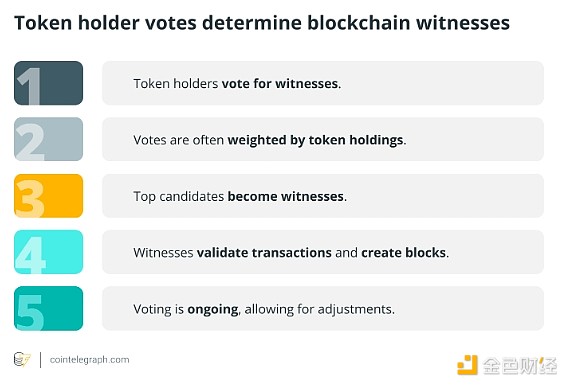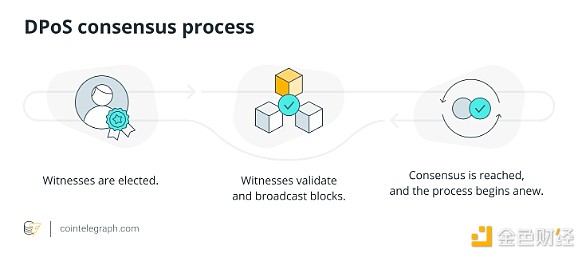Author: Shailey Singh, CoinTelegraph; Compiler: Baishui, Golden Finance
1. What is Delegated Proof of Stake (DPoS)?
DPoS is an evolution of the Proof of Stake (PoS) consensus mechanism, designed to provide enhanced scalability, efficiency, and democratic governance.
Blockchain technology has revolutionized the way we perceive and process digital transactions, primarily through its decentralized nature and consensus mechanisms. The main purpose of these decentralized mechanisms is to ensure that there is no central gatekeeper when managing blockchain transactions and data records. Instead, the consensus mechanism relies on network participants to verify transactions and add them as new blocks on the chain.
Among the various consensus algorithms, one mechanism that has received much attention is Delegated Proof of Stake. DPoS is a variant of the classic Proof of Stake consensus mechanism.
Daniel Larimer proposed the DPoS concept in 2014 as an enhancement of the traditional PoS consensus mechanism, designed to improve efficiency and scalability. Larimer first shared his vision in a Bitcointalk forum post, which led to the actual implementation of DPoS and the launch of BitShares in 2015.
This marked the beginning of DPoS in blockchain technology, laying the foundation for its adoption in other projects such as Steem and Eos. Eos, in particular, used the consensus mechanism to conduct one of the largest initial coin offerings (ICOs) in the cryptocurrency industry in 2017, which attracted a lot of attention to DPoS and highlighted its potential in achieving high performance and decentralized governance.
Second, how is DPoS different from other consensus mechanisms such as PoS?
DPoS is different from traditional PoS in that it uses a voting system to elect representatives for block validation, making the process more democratic and scalable.
The key to understanding all consensus mechanisms is how consensus is reached. While the Bitcoin blockchain introduced the first mechanism for reaching consensus on the blockchain through proof of work (PoW), there are some other ways for blockchain networks to reach consensus. PoS was introduced in an academic paper in 2012, written by Sunny King and Scott Nadal, as a new consensus mechanism to address the high energy consumption of Bitcoin mining.
PoS is one of the most common consensus mechanisms, and the Ethereum ecosystem adopted it in 2022. Gradually, various other secure iterations of PoS began to emerge, including hybrid PoS-PoW, pure PoS, and delegated PoS in 2014.
In a DPoS system, network users vote to delegate block validation rights to a selected group of witnesses or block producers. This process is designed to address some of the democratic limitations of the standard PoS algorithm by ensuring that the power to validate transactions is distributed among elected representatives, rather than concentrated in the hands of a few wealthy stakeholders.
This means that unlike traditional PoS where stakeholders directly validate transactions, DPoS allows token holders to elect representatives who are responsible for validating blocks.
In a DPoS system, network users vote to delegate block validation rights to a selected group of witnesses or block producers. This process aims to address some of the democratic limitations of the standard PoS algorithm by ensuring that the power to validate transactions is distributed among elected representatives rather than concentrated in the hands of a few wealthy stakeholders.
In this way, DPoS simplifies the block validation process, thereby reducing transaction confirmation time. The limited number of elected representatives also enhances the scalability of the network.
How does DPoS work?
The core mechanisms of DPoS revolve around voting, delegation, and validation.
DPoS enhances the traditional PoS system by incorporating an election mechanism, where network participants vote for representatives who are responsible for validating and creating blocks. This process involves four key participants: voters, witnesses (or block producers), representatives, and validators.
Voter
In the DPoS system, every network participant can become a voter even if they hold a minimum amount of native tokens, and there is no minimum stakeholder token participation requirement. Voters play a vital role in network governance by electing witnesses and representatives and participating in the decision-making process through governance proposals. Voting power is proportional to the number of tokens held, meaning that users with more tokens have more influence.
Voters can choose to vote themselves or delegate their voting power to another person. Their main responsibility is to select witnesses or block producers, as these entities are directly involved in the block production process. Therefore, voters have an incentive to choose trustworthy and capable candidates to ensure the smooth operation and security of the network.
Witnesses (Block Producers)
Witnesses, also known as block producers, are nodes favored by token holders to verify transactions and create new blocks. These entities are essential to the operation of the blockchain as they ensure the integrity and accuracy of transaction data. After verifying all transactions in a block, witnesses receive a block reward, which is usually shared with voters who supported them.

If a witness fails to verify a transaction within the stipulated time, they miss the block and forfeit the reward. This missed reward is usually passed on to the next witness who successfully verifies the block. The system incentivizes voters and witnesses to act honestly: voters aim to elect reliable witnesses to maximize their rewards, while witnesses strive to maintain their integrity and reputation to attract votes.
Delegates
Voters elect delegates to oversee governance functions in DPoS. Unlike witnesses, who focus on block production, delegates are responsible for proposing improvements and changes to the network. These proposals range from modifying the block size to adjusting the block reward.
Once a delegate makes a proposal, it must be voted on by network participants before it can be implemented. Representatives themselves do not have the power to directly apply changes to the system; their role is to promote and propose improvements, which are then approved by the community. This separation of duties helps maintain a balanced and decentralized governance structure.
Validators
Validators are full nodes that verify that blocks created by witnesses comply with consensus rules. Unlike witnesses, any user can become a validator, and there is usually no direct economic incentive to perform this role. Validators play a key role in maintaining the integrity of the blockchain by ensuring that all blocks comply with established rules and protocols.
IV. Incentive and governance mechanism of DPoS
The DPoS mechanism coordinates the incentives of all participants to promote a secure and efficient network. Voters are incentivized to select capable witnesses and representatives to maximize their rewards and ensure the integrity of the network. In turn, witnesses and representatives are also motivated to maintain their reputation and act in the best interests of the network to retain their positions and continue to receive rewards.
The whole process looks simple:

The continuous voting process and the ability to replace poorly performing or malicious actors help to establish a dynamic and resilient governance model. The system promotes a high level of community participation and ensures that decision-making power remains distributed to stakeholders.
V. Advantages of DPoS
DPoS has several advantages over other consensus mechanisms, making it the first choice for some blockchain projects.
DPoS provides several significant advantages that can enhance the performance and governance of blockchain networks. One of the main benefits is its accessibility. Unlike PoW systems that require a lot of computing power and dedicated equipment, DPoS allows anyone who owns native tokens to participate in the voting process and become a representative. This low barrier to entry promotes a more inclusive network, allowing a wider range of participants to participate in the consensus mechanism.
Another significant advantage of DPoS is its scalability. By limiting the number of delegates responsible for block production, DPoS can achieve faster consensus, thereby increasing transaction throughput and improving network performance. In addition, DPoS is environmentally friendly because it does not require the large amount of energy consumption associated with PoW systems. This sustainability aspect is in line with the growing demand for green technology.
In addition, the democratic nature of DPoS promotes a more decentralized governance model. The continuous voting process ensures that representatives are accountable to the community and stakeholders can actively participate in the decision-making process. This dynamic governance structure can quickly adapt and implement network improvements, thereby enhancing the overall resilience and development of the blockchain.
VI. Limitations of DPoS
Despite its many advantages, DPoS also has its limitations and challenges.
One of the main concerns is the possibility of centralization. Although DPoS is designed to decentralize decision-making power, the system may inadvertently concentrate power in the hands of a small number of delegates.
Because the number of elected representatives is limited, there is a risk that a small group of representatives could dominate the network, leading to centralization issues similar to those seen in traditional PoS systems. This concentration of power could put the network at risk of collusion and malicious activity.
In addition, DPoS requires a high level of voter participation and awareness. For the system to work effectively, voters must be fully informed about the candidates and their performance. However, smaller stakeholders may feel that their vote is insignificant and choose not to participate, reducing the overall robustness of the consensus mechanism.
In addition, the reliance on a limited number of representatives raises security concerns. If a majority of representatives collude or act maliciously, they could perform a 51% attack, compromising the security and stability of the network. This vulnerability requires the community to remain vigilant and proactive to ensure that honest and capable representatives are continuously elected.
DPoS represents an evolution in blockchain consensus mechanisms. As blockchain technology evolves, DPoS aims to provide a framework for achieving decentralized governance and efficient block validation.
 Alex
Alex
 Alex
Alex JinseFinance
JinseFinance JinseFinance
JinseFinance JinseFinance
JinseFinance CoinBold
CoinBold Bitcoinist
Bitcoinist 链向资讯
链向资讯 Ftftx
Ftftx 链向资讯
链向资讯 Cointelegraph
Cointelegraph